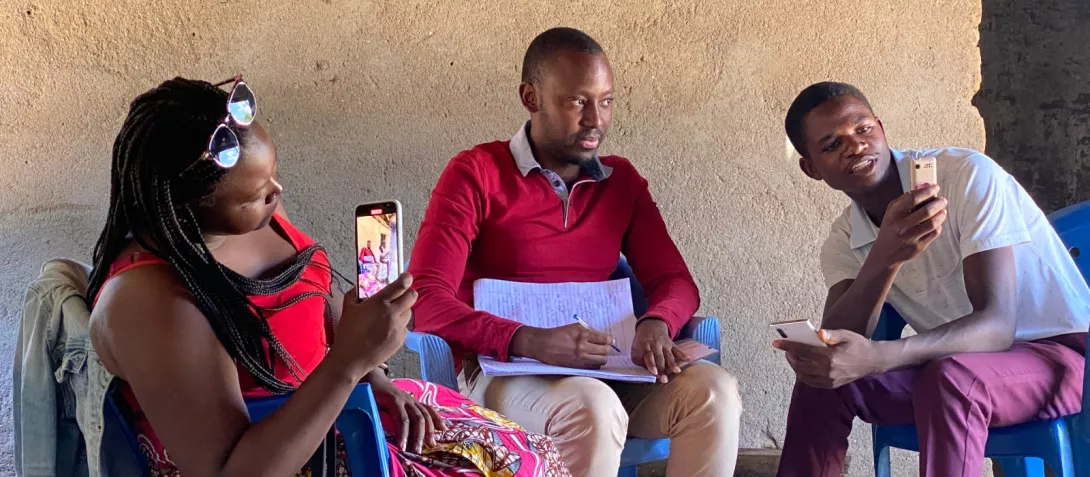
Context and Problem Statement
Land degradation and desertification, causing the loss of 75 billion tons of fertile soil and 12 hectares annually, significantly impact global temperatures. Factors such as excessive agriculture practices and overgrazing contribute to damaged soil structure, increased erosion, and reduced fertility.
Justdiggit (Just-dig-it), a non-profit organization, addresses these challenges. Their mission is to restore degraded landscapes, increase food security, and improve lives in dryland areas of Africa. With on-the-ground landscape restoration programs in mostly Kenya and Tanzania, they sought innovative solutions to scale-up regreening without physical presence, leading to the creation of the REGREEN APP—a contactless, digital platform accessible through farmers' smartphones.
The Regreen Application, initiated by Justdiggit, employs a gamified approach to provide tailored and step-by-step regreening education and advice to farmers. (read more here). Regreening, the process of restoring landscapes and improving soil fertility, is facilitated through interactive quizzes, videos, leaderboards, and direct communication with regreening experts.
Justdiggit partnered with YUX to conduct user research to delve into the educational needs of farmers, cultural context of learning, the compatibility of farmers' phones with the app and the current usability of the Regreen app with a focus of driving adoption and penetration of the Regreen app in rural areas.
Research Methodology
Our user research approach aimed to thoroughly assess the Regreen app by blending exploratory and evaluative methods, ensuring a comprehensive understanding of its potential impact on Sub-Saharan African farmers. Goals were divided into:
Exploratory Research Goals
App Usage & Impact: To test the value proposition of the app: i.e. do farmers think the app could teach them how to regreen, and would they use it in their daily life, does this application help them learn about regreening from their phones?
Evaluative Research Goals
Usability Testing: To test the usability of the app: i.e. are the farmers able to go through the different elements of the app, and are they using them correctly? What do they think of the different elements and the look & feel of the app?
The research journey commenced with a collaborative inception meeting between Justdiggit and YUX teams. During this session, we aligned our goals and objectives for the study. Following this, we conducted an in-depth stakeholder engagement with six key members of the Justdiggit team. This step provided crucial insights into the user base of the Regreen app, enabling us to tailor our research approach to precisely match their objectives. The stakeholder engagement phase laid a solid foundation for a successful research study.
User Segments and Recruitment
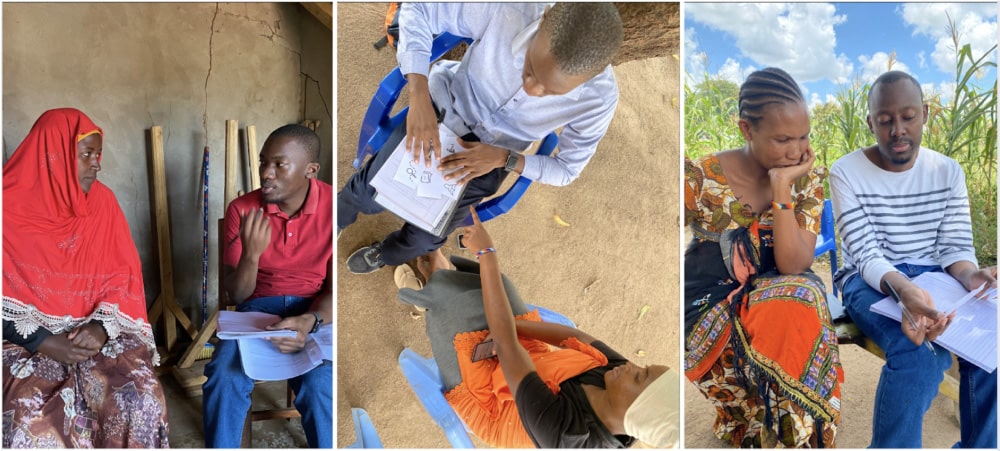
Local researchers conducting user research with farmers in their home / convenient locations
We conducted a total of 21 interviews onsite in 3 different districts in Dodoma, Tanzania. Out of the 21 interviews, 11 were female and 10 were male. We engaged with different groups of farmers to be able to gain different insights.
Champion farmers; these are Justdiggit & partner organization LEAD Foundation trained farmers who serve as facilitators and ambassadors of regreening to other farmers within the community
Non-Justdigit farmers; these were farmers who are not part of the Justdiggit programme and would be able to provide insights as new fresh eyes.
Recruitment is solely handled by LEAD Foundation, a non-profit organization based in Tanzania that is dedicated to improving the lives of marginalized communities, with a focus on finding innovative & sustainable solutions on key areas such as health, education, environment.
The research phase in the field lasted a total of 6 days, however, the total engagement from inception to handover lasted a total of 3 months.
YUX researchers Sasha and Yaandé teamed up with local researchers Collins and Isaack from the Westerwelle Foundation to conduct the research. The decision to partner with local researchers in Tanzania was made due to the language barrier with Kiswahili, as well as the importance of having a team with cultural understanding and context. (both Sasha & Yaandé are from Ghana & Senegal respectively)
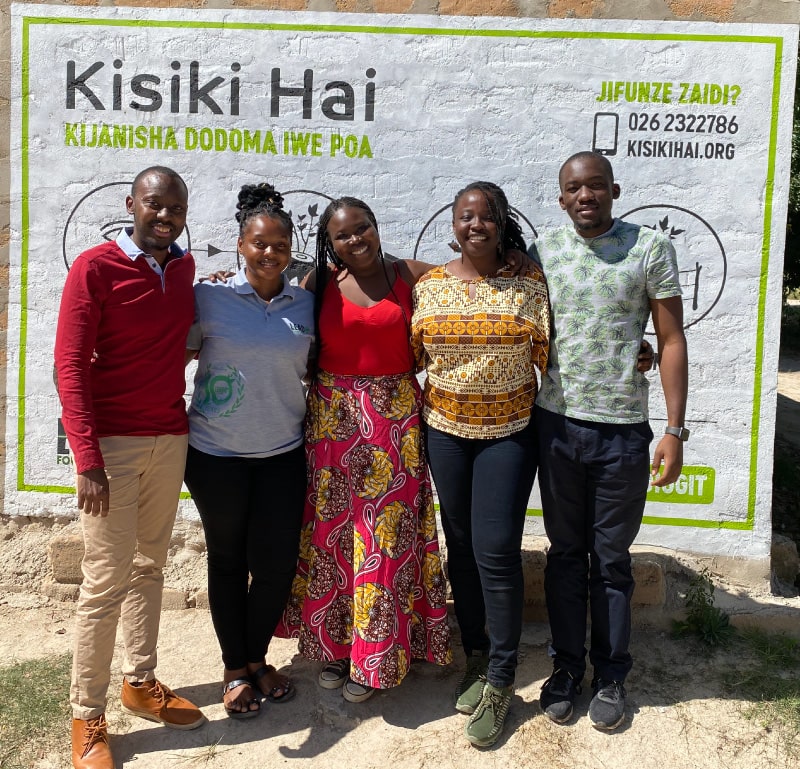
Local researchers Collins(left), Isaack(right) - YUX Researchers: Yaandé (red blouse), Sasha (brown blouse), Angelina Tarimo(grey blouse) : LEAD Foundation Coordinator
Key Insights from User Research
The icon identification activity revealed a significant challenge as farmers struggled to associate meanings with the icons provided. Farmers found it challenging to interpret icons like measuring tape or surveyor tools commonly used in the app. One farmer remarked, "You people! you have brought us foreign signs! We are used to using rope; one person stands here, one person stands there to measure." This emphasized the disparity between the icons presented in the app and the farmers' local, rope-based land measurement
practices. As a result, the research team quickly adapted the activity, allowing farmers to draw representations based on their familiar concepts, shedding light on the necessity for culturally sensitive iconography in the app's design. (Read more on icon identification activities in Zambia.)
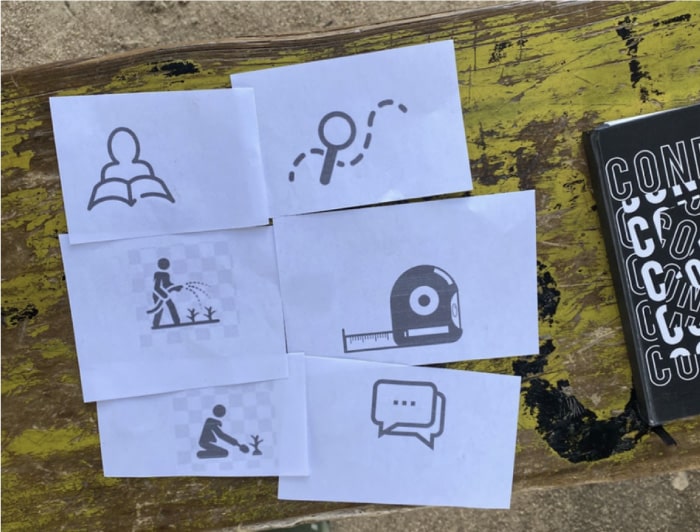
Sample icons used during icon identification activity with farmers on the field
The popularity of "Guest mode" among farmers reveals a strong preference for previewing application content before committing to personal details. Farmers associated the act of "creating an account" with formality, akin to opening a bank account, and perceive it as a task for experienced individuals. Expressing their preference for "Guest mode," farmers emphasize a desire to explore the app's offerings and build familiarity before engaging in a more formalized interaction, highlighting the importance of user-friendly onboarding processes tailored to the farmers' comfort levels and perceptions
“I want to taste and see first before I create an account”
Ahmadou, elder farmer, Dodoma
“Creating an account is for experienced people, for me, I would keep using "guest mode" because I am inexperienced.”
Fatima, young farmer, Dodoma
Farmers want to be identified with their personal images as compared to using avatars; Farmers strongly prefer personal identification using their images or images of their farm/trees to show how well their trees are growing over anonymous avatars on the platform. Contrary to the research team's initial hypothesis regarding potential privacy concerns, farmers are driven by a desire for recognition within the community, highlighting the importance of genuine personalization for fostering trust and engagement
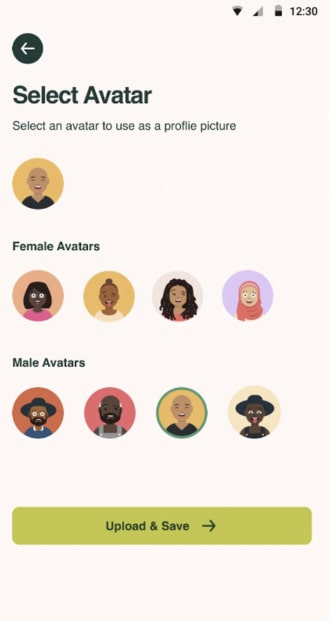
"I am human being and not a cartoon”
Ahmadou, elder farmer, Dodoma
Research analysis and synthesis process
The research analysis and synthesis phase seamlessly transitioned into a 2-hour creativity workshop, engaging key partners and decision-makers from the Justdiggit team. This collaborative session aimed to identify, explore, and prioritize opportunity areas. Leveraging the Red Routes tool, we meticulously assessed features based on their perceived impact versus the effort required for implementation. Features falling under "High Impact, Low Effort" and "High Impact, Medium Effort" were earmarked for the upcoming implementation phase.
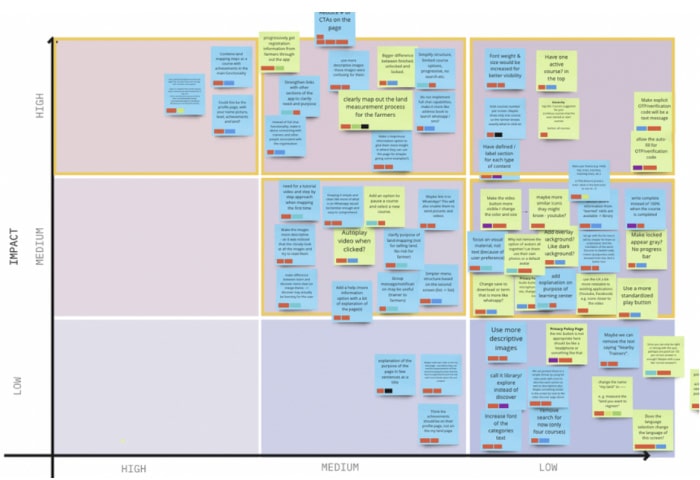
Implementation phase
These prioritized features became the foundation for the next steps, transitioning into the hands of our UI designers for the final project phase—UI redesign. Maintaining a continuous thread of collaboration and alignment, we ensured regular check-ins with the UI team, fostering a cohesive approach to bring the envisioned features to life.
Project Outcome - UI/UX Re-design of Regreen App
Following the research and synthesis phase, the project transitioned seamlessly from wireframes to high-fidelity UI design for the Regreen application. Some of the screens designed were adjusted based on previously developed designs by Justdiggit partners, other screens were completely remodeled/ added based on the the collected data and prioritized features from the creativity workshop
A special acknowledgment goes to our skilled UI/UX designer, Johnson Chidubem, for bringing these concepts to life and ensuring the final UI screens align seamlessly with the project's goals and user expectations..
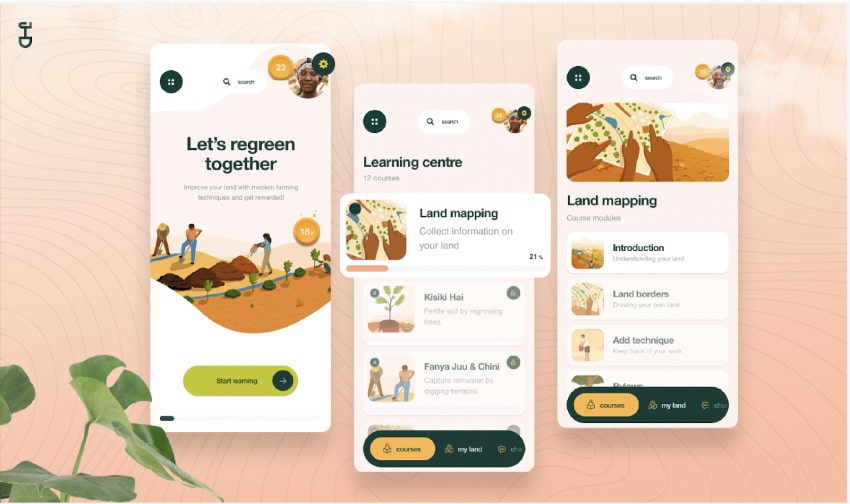
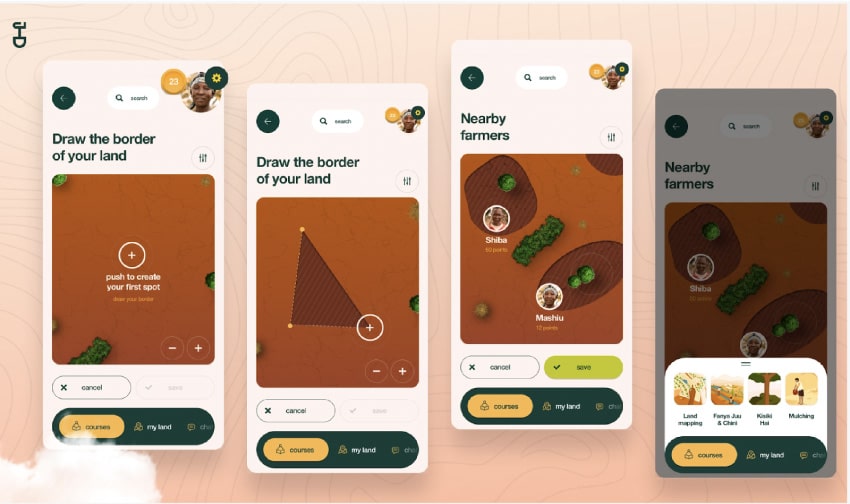
Business Outcomes
In 2021, Justdiggit joined forces with LEAD Foundation and KaiOS, a smart feature phone provider, to test the feasibility of teaching and mobilizing farmers via mobile applications (on low-tech smart feature phones).
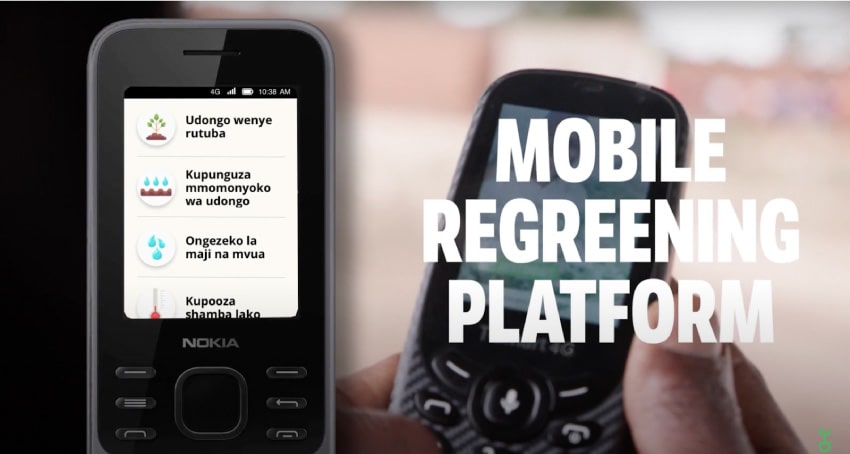
The pilot phase involved 300 farmers, and 69% of them reported learning regreening techniques through the app, proving the concept to be successful. This result was a significant factor in Justdiggit securing a €1 million grant from the Dutch National Lottery to further develop and scale the project, making regreening techniques more accessible to farmers via mobile technology. (read here).
The developed Regreen app is set to launch on smartphones in mid-2024, starting in Tanzania. This marks the next big step for Justdiggit. After that, the aim is to make the app available to more farmers in other Sub-Saharan African countries.
YUX played a vital role in contributing to the research, ideation, testing and re-design of the Regreen app, and we are honored to have been part of a project that will benefit a larger number of farmers in the foreseeable future in Africa.
Visit the Justdiggit Website here
